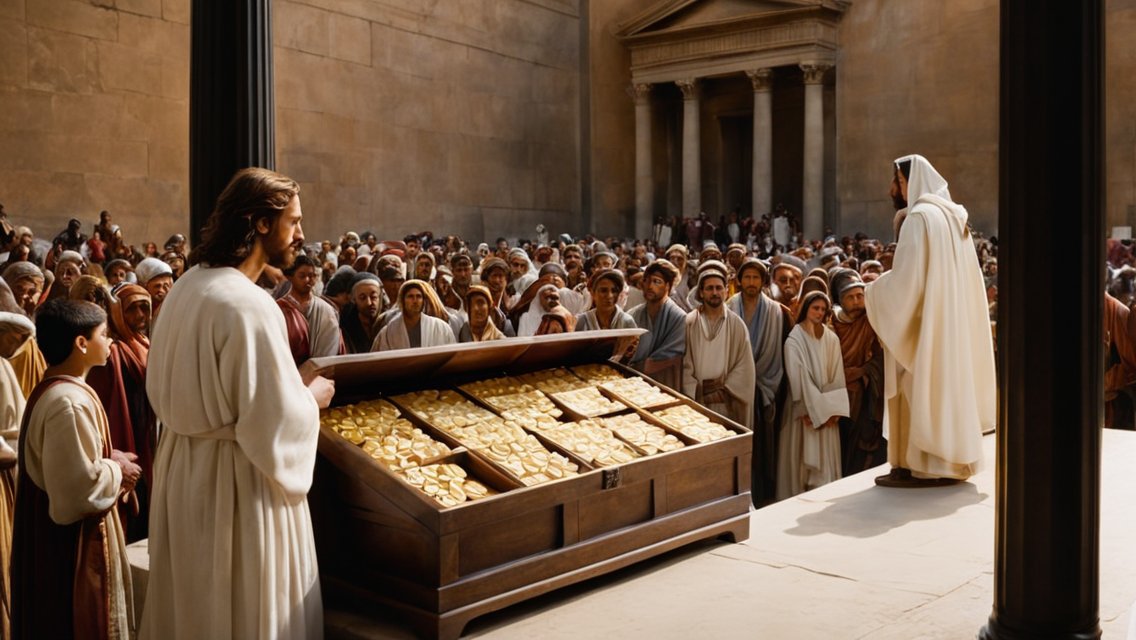Twenty-first Sunday Homily of the Ordinary Time – Year B
Readings: Jos 24:1-2, 15-l8, Eph 5:21-32, Jn 6:60-69
1st Reading – Joshua 24:1-2A, 15-17, 18B
1 Joshua gathered together all the tribes of Israel at Shechem, summoning their elders, their leaders, their judges, and their officers. When they stood in ranks before God,
2A Joshua addressed all the people:
15 “If it does not please you to serve the LORD, decide today whom you will serve, the gods your fathers served beyond the River or the gods of the Amorites in whose country you are now dwelling. As for me and my household, we will serve the LORD.”
16 But the people answered, “Far be it from us to forsake the LORD for the service of other gods.
17 For it was the LORD, our God, who brought us and our fathers up out of the land of Egypt, out of a state of slavery. He performed those great miracles before our very eyes and protected us along our entire journey and among the peoples through whom we passed.
18B Therefore we also will serve the LORD, for he is our God.”
Responsorial Psalm – Psalms 34:2-3, 16-17, 18-19, 20-21
R. (9a) Taste and see the goodness of the Lord.
2 I will bless the LORD at all times;
his praise shall be ever in my mouth.
3 Let my soul glory in the LORD;
the lowly will hear me and be glad.
R. Taste and see the goodness of the Lord.
16 The LORD has eyes for the just,
and ears for their cry.
17 The LORD confronts the evildoers,
to destroy remembrance of them from the earth.
R. Taste and see the goodness of the Lord.
18 When the just cry out, the LORD hears them,
and from all their distress he rescues them.
19 The LORD is close to the brokenhearted;
and those who are crushed in spirit he saves.
R. Taste and see the goodness of the Lord.
20 Many are the troubles of the just one,
but out of them all the LORD delivers him;
21 he watches over all his bones;
not one of them shall be broken.
R. Taste and see the goodness of the Lord.
2nd Reading – Ephesians 5:21-32
Brothers and sisters:
21 Be subordinate to one another out of reverence for Christ.
22 Wives should be subordinate to their husbands as to the Lord.
23 For the husband is head of his wife just as Christ is head of the church, he himself the savior of the body.
24 As the church is subordinate to Christ, so wives should be subordinate to their husbands in everything.
25 Husbands, love your wives, even as Christ loved the church and handed himself over for her
26 to sanctify her, cleansing her by the bath of water with the word,
27 that he might present to himself the church in splendor, without spot or wrinkle or any such thing, that she might be holy and without blemish.
28 So also husbands should love their wives as their own bodies. He who loves his wife loves himself.
29 For no one hates his own flesh but rather nourishes and cherishes it, even as Christ does the church,
30 because we are members of his body.
31 For this reason a man shall leave his father and his mother and be joined to his wife, and the two shall become one flesh.
32 This is a great mystery, but I speak in reference to Christ and the church.
OR Ephesians 5:2A, 25-32
Brothers and sisters:
2A Live in love, as Christ loved us.
25 Husbands, love your wives, even as Christ loved the church and handed himself over for her
26 to sanctify her, cleansing her by the bath of water with the word,
27 that he might present to himself the church in splendor, without spot or wrinkle or any such thing, that she might be holy and without blemish.
28 So also husbands should love their wives as their own bodies. He who loves his wife loves himself.
29 For no one hates his own flesh but rather nourishes and cherishes it, even as Christ does the church,
30 because we are members of his body.
31 For this reason a man shall leave his father and his mother and be joined to his wife, and the two shall become one flesh.
32 This is a great mystery, but I speak in reference to Christ and the church.
Alleluia – John 6:63C, 68C
R. Alleluia, alleluia.
63C Your words, Lord, are Spirit and life;
68C you have the words of everlasting life.
R. Alleluia, alleluia.
Gospel – John 6:60-69
60 Many of Jesus’ disciples who were listening said, “This saying is hard; who can accept it?”
61 Since Jesus knew that his disciples were murmuring about this, he said to them, “Does this shock you?
62 What if you were to see the Son of Man ascending to where he was before?
63 It is the spirit that gives life, while the flesh is of no avail. The words I have spoken to you are Spirit and life.
64 But there are some of you who do not believe.” Jesus knew from the beginning the ones who would not believe and the one who would betray him.
65 And he said, “For this reason I have told you that no one can come to me
unless it is granted him by my Father.”
66 As a result of this, many of his disciples returned to their former way of life and no longer accompanied him.
67 Jesus then said to the Twelve, “Do you also want to leave?”
68 Simon Peter answered him, “Master, to whom shall we go? You have the words of eternal life.
69 We have come to believe and are convinced that you are the Holy One of God.”
Moral Story for the homily
In a small village, there lived a wise and hardworking farmer. One day, two traders approached him with offers to buy his crops. One trader promised immediate payment, but with an uncertain future harvest. The other offered delayed payment but guaranteed long-term success and partnership. Continue to Read
Homily
Decision, Derision & Devotion
“Lord, who shall we go to? You have the message of
eternal life, and we believe” (In)
A young man phoned a Card Shop and enquired, “Do you remember my wedding cards I ordered last week?” The shopkeeper said, “Yes!” The youth continued, “Well, could I make some small changes?” The shopkeeper replied, “Go ahead, and give me the new details.” The youth said, “Okay, it’s a different date, a different church and a different woman.” Taking decisions and being single-mindedly devoted to someone is being increasingly regarded as an almost impossible task. Yet, today’s three readings call for choice, and for the commitment to bring that choice to full fruition.
Joshua places a choice before his people in the first reading. The original inhabitants of Shechem worshipped El-berith and the gods of the Amorites, while the Israelite invaders worshipped Yahweh. Joshua declares, “Me and my House will serve the Lord.” Remembering the wonders the Lord worked for them, the people reply, “We too will serve the Lord, for he is our God.” This choice is a consequence of the Covenant.
The people’s decision to choose Yahweh in the first reading is reiterated in the disciples’ decision to follow Jesus rather than forsake him. Today’s gospel passage is the last segment of the ‘bread discourse’ in john’s gospel (ch.6). Jesus’ straight talk is difficult to digest. “This is intolerable language. How could anyone accept it?” Such grumbling grows not merely on account of Jesus’ cryptic flesh-and-blood sayings, but because of the whole of his revelation as God’s Wisdom that is unacceptable and creates conflict;
Jesus’ words to the Twelve are pointed and poignant: “Do you want to go away too?” Peter’s profession of faith is no less powerful: “Lord, who shall we go to? You have the message of eternal life, and we believe; we know that you are the Holy One of God!” Though Peter will deny Jesus, he will later rise up and ratify his own decision with his own ‘blood covenant’ by being crucified like his Lord.
The second reading situates the issue of decision and devotion in the context of the Christian family. Paul skillfully weaves two parallel themes together: (a) the family commitment between husband and wife, and (b) the ecclesial relationship between Christ and the Church. From the traditional household code given by Moses in which the wife is simply subjected to the husband without qualification, Paul tells husbands to “love your wives just as Christ loved the Church.” Indeed, the ancient household Code is turned upside down- devotion is not only the wife’s duty, but it is an imperative binding husbands to love their wives Husbands must love their wives as ‘subjects’, not objects.
Today’s global world offers the ‘Christian consumer’ enticing possibilities of choice. Multinational companies seek the single-minded devotion of their employees by providing perks like aerobics, sauna-baths, gymnasiums and wild weekend parties in and around work premises. Thus, many families suffer from infighting and infidelity. Further, a new ‘throwaway culture’ makes everything and everyone disposable-spouses included. “Familiarity breeds contempt” excuses suffice to desert friends, divorce spouses and deride faith and faithfulness.
A young woman complained to a saleswoman that she was unhappy with the colourful dress she had purchased. “My boyfriend doesn’t like it!” she lamented. The saleswoman allowed her to exchange the dress. Days later she returned and bought the same dress. “What happened? Has your boyfriend changed his mind?” asked the saleswoman. “No!” replied the woman, “I’ve changed my boyfriend!”
Taking a decision is difficult. Especially when it involves lifelong devotion. The marriage pledge between husband and wife, and the religious promises of priests and nuns need deep discernment and openness to God’s Spirit. “The words i have spoken to you are spirit and they are life,” says Jesus. Yes, let’s always opt for Spirit and for Life. This is what God wants us to cheese. And with Peter, let’s whisper, “Lord, who shall we go to? You have the message of eternal life.”





